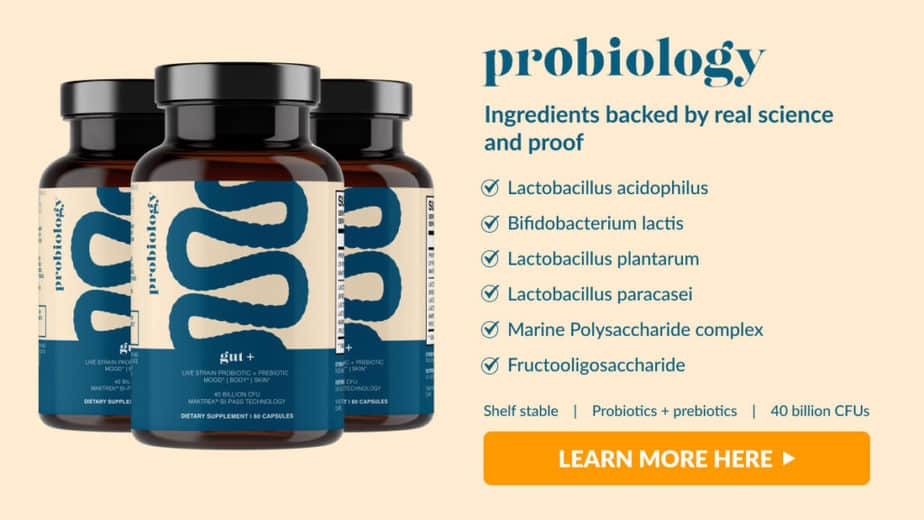If you have just started taking probiotics recently, and you have been taking them consistently for a few days or maybe even longer, then you might be wondering how long it is going to take before they start to work.
This is something that can vary for different people, but there is a certain length of time in which you should start to reap the benefits of them.
Probiotics can be really useful for a variety of different health reasons, which is why you might be keen to see results soon after you start taking them.
This is why we are going to explore probiotics and how long they should take to start working in this article.
So, if you want to find out how long you need to wait before they start to work, then you have come to the right place.
However, when it comes to taking probiotics, it is important to understand exactly how they work before you can begin to understand why and when they will start to work.
So, before we get into the length of time that it takes to start benefiting from taking probiotics, we are going to look at exactly how they work.
What Are Probiotics?
According to the World Health Organization, probiotics are defined as “live microorganisms which when consumed in adequate amounts as part of food confer a health benefit on the host.”
So, when you are taking probiotics, you are actually introducing lots of beneficial bacteria to your gut. This can be highly beneficial for a variety of different reasons.
If you have resorted to taking probiotics, then you are probably aware of how beneficial they can be.
Some people take them to contribute to better digestive health, but there are other health benefits that they offer too.
Most people hope to see results quickly after taking these capsules, which is understandable if you are trying to improve your overall health.
We are going to take a look at everything that you need to know and understand about probiotics, and when you should start to notice some differences in your digestive health.
How Do Probiotics Work?
Something that you might not have known is that the human body actually needs helpful bacteria in order to function properly.
Good bacteria will allow the body to properly digest food, absorb vitamins, regulate weight and inflammation, boost your immunity, and affect your mood.
Basically, your body needs this good bacteria, but it does not need excess amounts of bad bacteria, which can sometimes overgrow in your gut and lead to health issues.
When bad bacteria grows in the gut to high levels, you can start to experience some digestive problems, like gas, bloating, and pain.
The collection of good and bad bacteria in your gut is called your gut microbiome, and it is really important to ensure that you have more good bacteria in your microme than bad.
This balance is key to your digestive health. If your microme is imbalanced, which is when there is more bad bacteria present than good, you will have what is called dysbiosis.
This is something that is associated with a variety of health conditions.
If you have noticed that you are experiencing gut issues, then it is really important to work towards rebalancing your microme with probiotics. This can really help you to improve your symptoms, along with your gut health.
Probiotics in the Gut Microbiome
There are quite a fews methods that you can follow that will allow you to add good bacteria to the gut to help with dysbiosis.
The first thing is to take probiotics, as this will add beneficial bacteria directly to your gut microbiome, which will help to tip the balance of bacteria towards the good side.
As well as this, probiotics can help to push out any bad bacteria that is already in your gut, and they can produce antimicrobial compounds that can help to eliminate any harmful bacteria.
Reducing Inflammation With Probiotics and Improving Digestive Symptoms
Something else that is really important to be aware of is the fact that probiotics and prebiotics can help to reduce inflammation within the gut, and therefore, in the rest of the body.
Inflammation is really bad for proper digestion as it can exaggerate intestinal permeability, interfere with insulin signaling, and cause digestive symptoms that you don’t want to experience.
You might be wondering why dysbiosis causes inflammation in the first place, and the answer to this is that the bad bacteria living within the gut have toxic molecules that are called lipopolysaccharides in their outer membrane.
These lipopolysaccharides will trigger an inflammatory response in the body, and this response is what is associated with digestive symptoms and other health issues.
With fewer bad bacteria and LPS around, inflammation will decrease.
Due to the fact that probiotics can increase the amount of beneficial bacteria and reduce the number of bad bacteria in your gut, there will be a lower chance that the lipopolysaccharides will be prevalent enough to cause inflammation.
How Long Before Probiotics Start to Work?
In order for the probiotics to start to alleviate your digestive symptoms, it needs to start to rebalance the gut microbiome by adding good bacteria.
Reducing the number of bad bacteria in the gut is essential before you will start to experience the benefits of probiotics, and this can take some time.
The probiotics will also work to lower inflammation by reducing the amount of lipopolysaccharides that are in the gut
After time, adding enough good bacteria to your microbiome will start to overpower the bad bacteria, but this process will take time.
This is why it is so important to be consistent when you are taking probiotics, and make sure that you take them daily, as instructed. This is the only way in which the process will be successful.
However, the reduction of inflammation in the gut and body is essential to noticing a significant improvement in symptoms, but this won’t happen overnight. When you are taking probiotics, they will be working towards all of these goals.
During this time, it is possible to experience some side effects that are temporary and mild.
More often than not, you will start to notice significant changes in your symptoms after you have consistently taken probiotics for around 2 to 3 weeks.
However, it can sometimes take longer than this as everyone is different. The amount of time that it takes for your symptoms to improve will depend on how inflamed and unbalanced your microbiome was to start with.
Taking Both Probiotics and Prebiotics
Probiotics are the perfect solution when you are trying to rebalance your microbiome.
However, something that can help to make the process move along a bit faster is prebiotics. These are basically food for your good bacteria, and if the good bacteria is thriving, they will start to grow more efficiently.
Feeding your good bacteria will help them to do their job more quickly and thrive, which will increase your good bacteria, decrease your bad bacteria, and reduce inflammation.
Prebiotics come in natural forms in certain types of foods, but you can also find them in supplement form.
- Related Article: Effects of Taking Probiotics and Prebiotics Together

How Long for Probiotics to Work Final Thoughts
It is important to keep in mind that this is not a process that will happen overnight. There are many things that the probiotics will need to tackle within your body before you will start to notice the effects of them.
You can try to speed up the process by taking prebiotics to strengthen your good bacteria, but ultimately, it is going to take between 2 to 3 weeks or longer for you to notice the effects of the probiotics.
Overthrowing the bad bacteria that has been taking over your gut and working to remove them, all while reducing the inflammation that the bad bacteria had produced is a process that is going to take some time.
So unfortunately, you are just going to have to sit tight and keep taking those probiotics consistently.
The more consistent that you are, then more likely that you are to see results sooner rather than later. Just remember, everyone is different, so it is really important to be patient. It will start to work over time, it just might take a bit longer for some people than it does for others.
But hopefully, you will be back to having a healthy gut in no time.
For other articles on probiotics, take a look at these:

